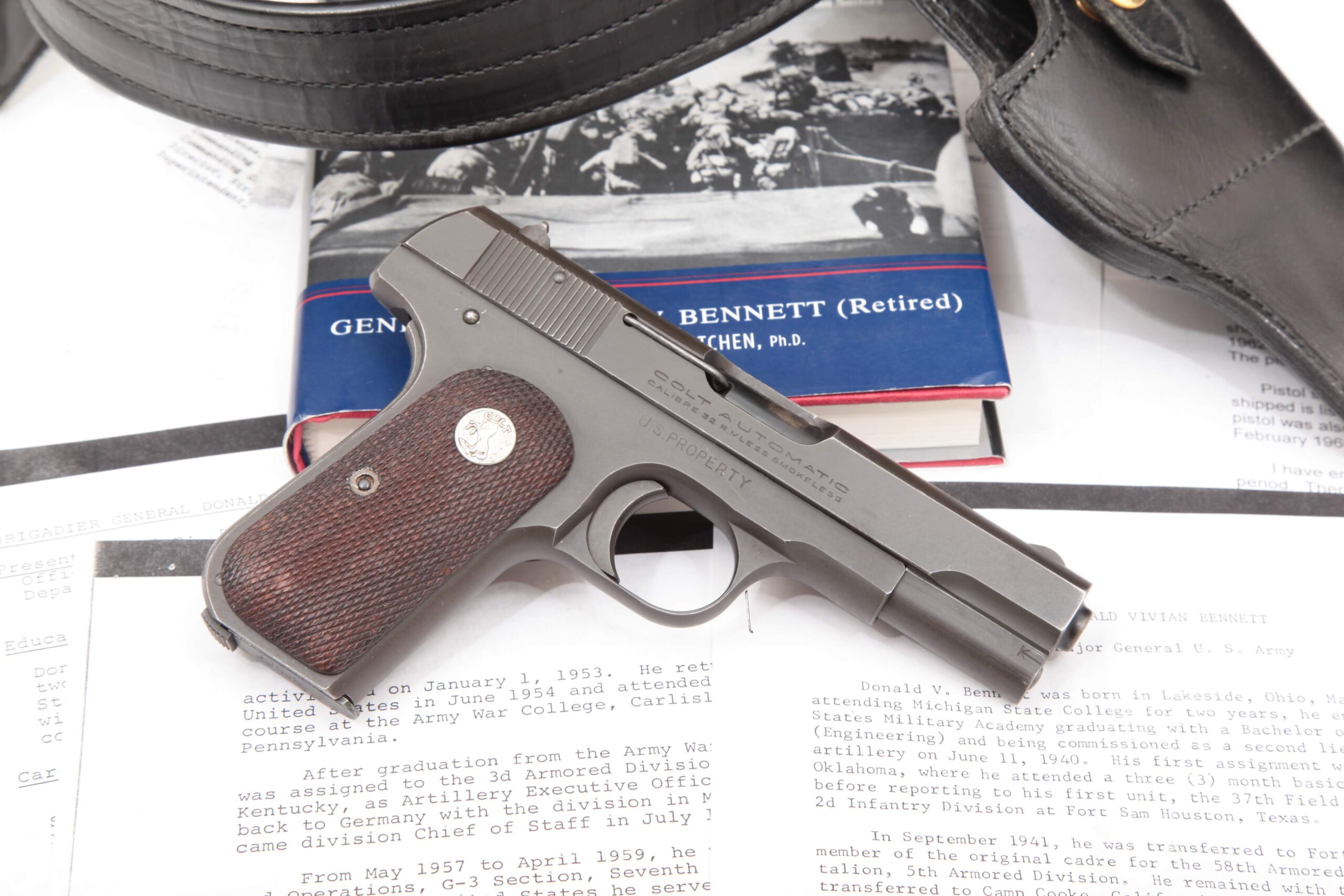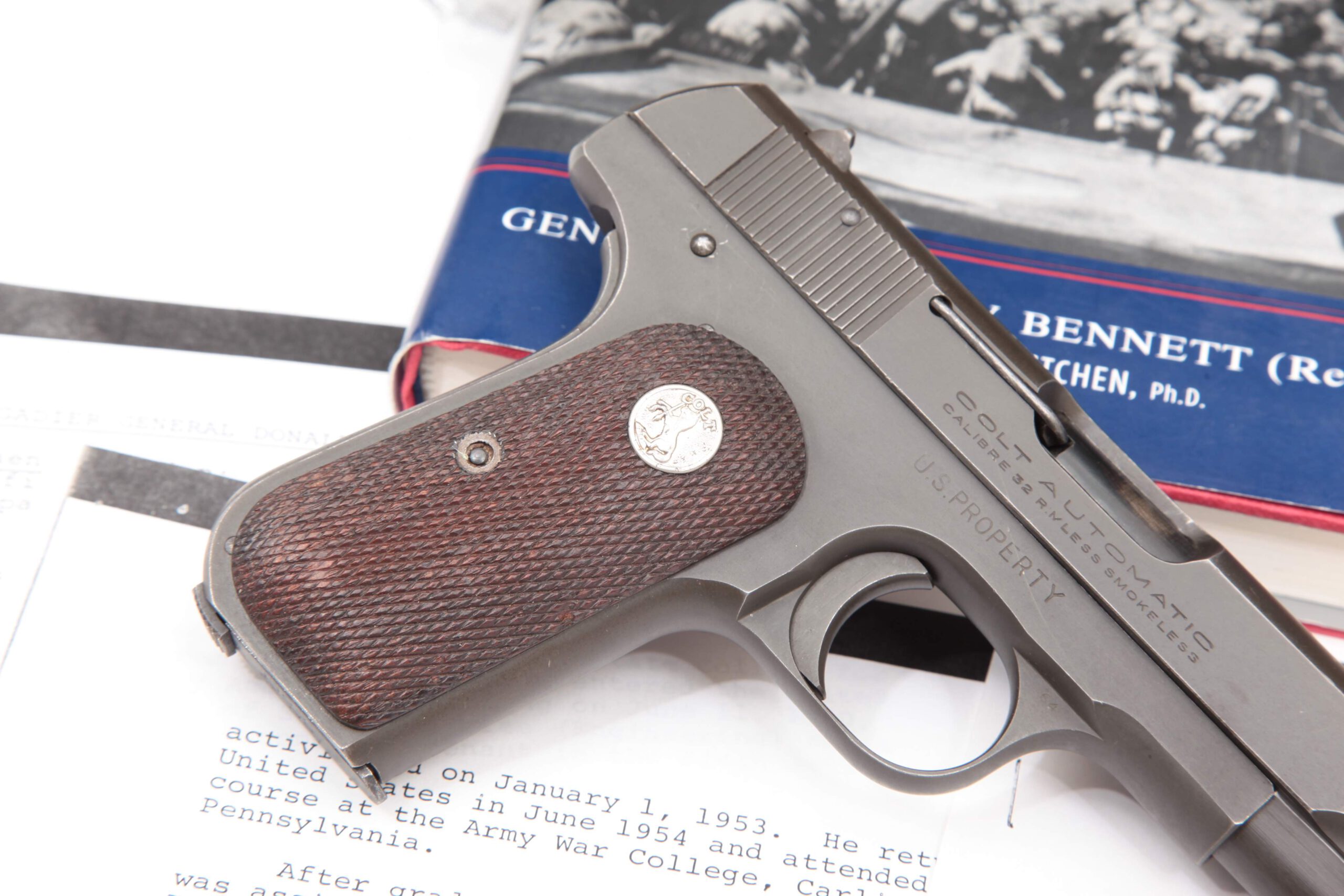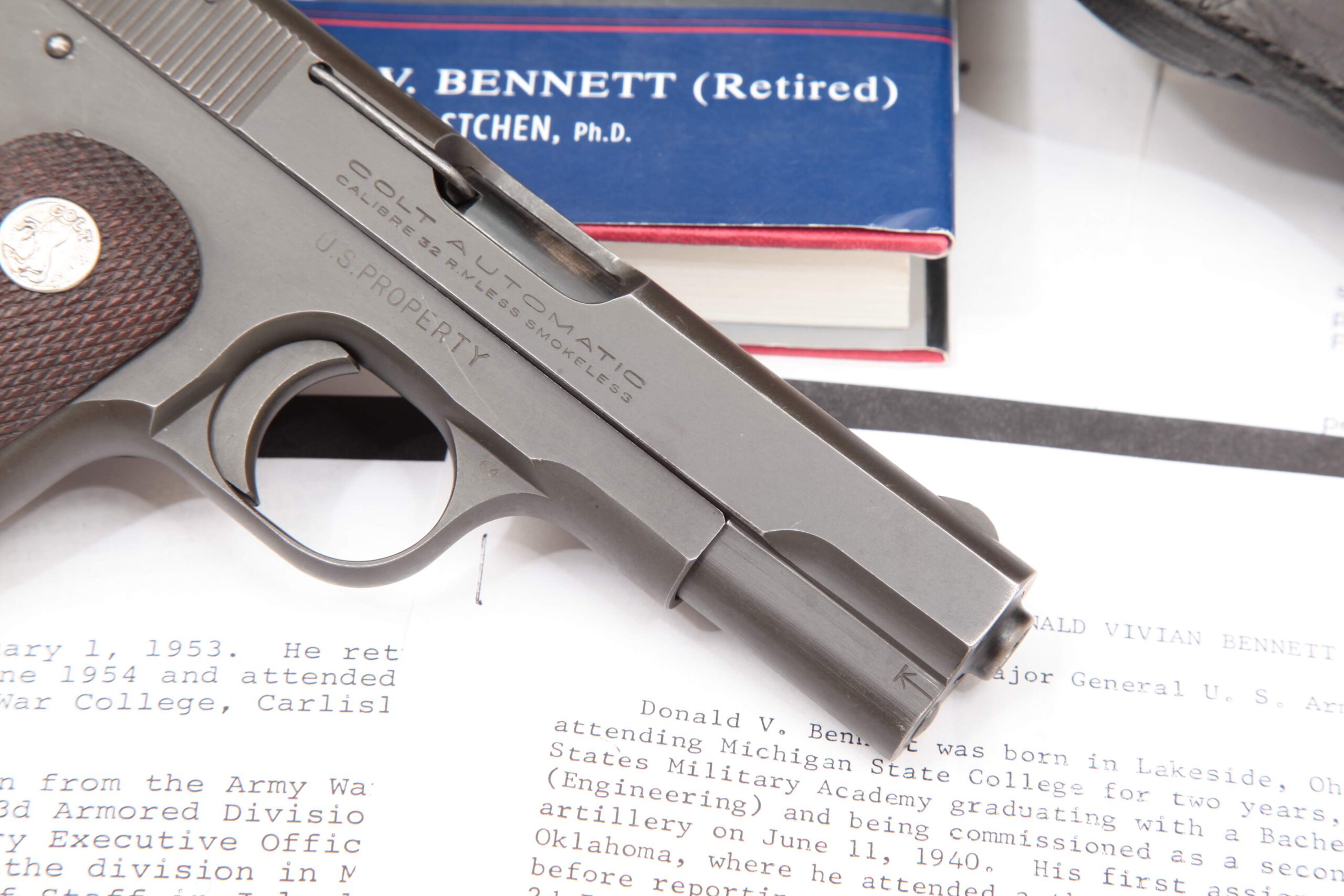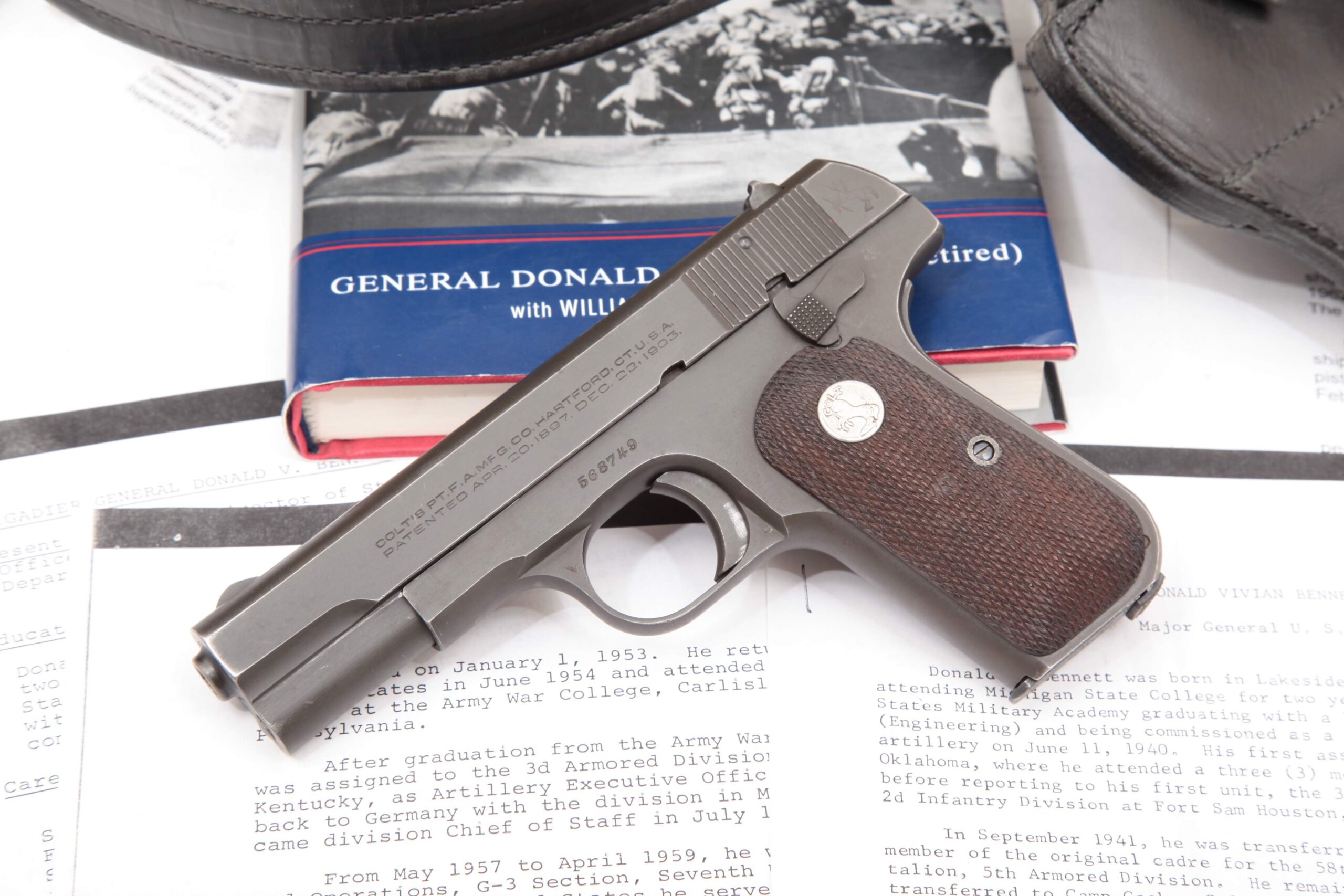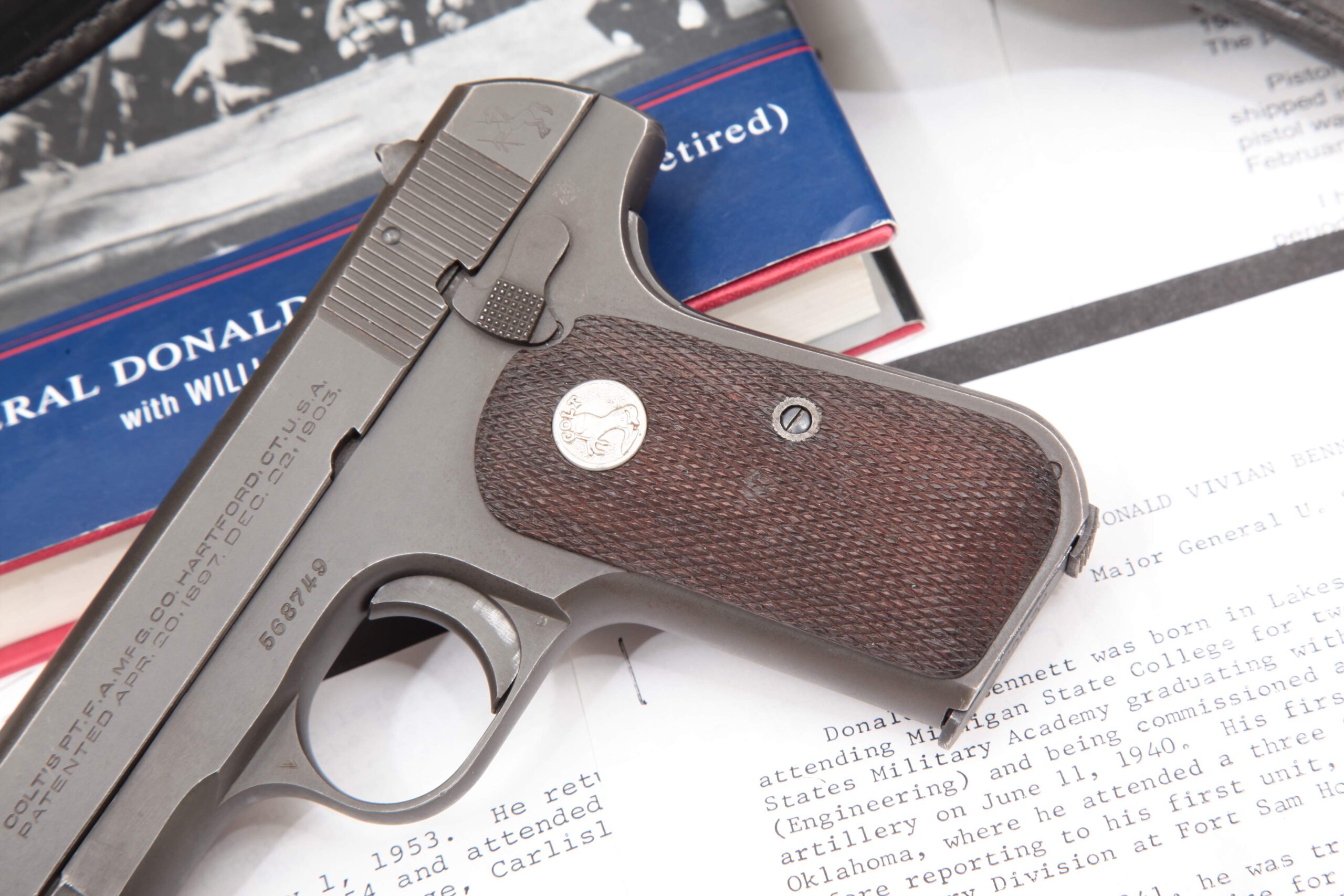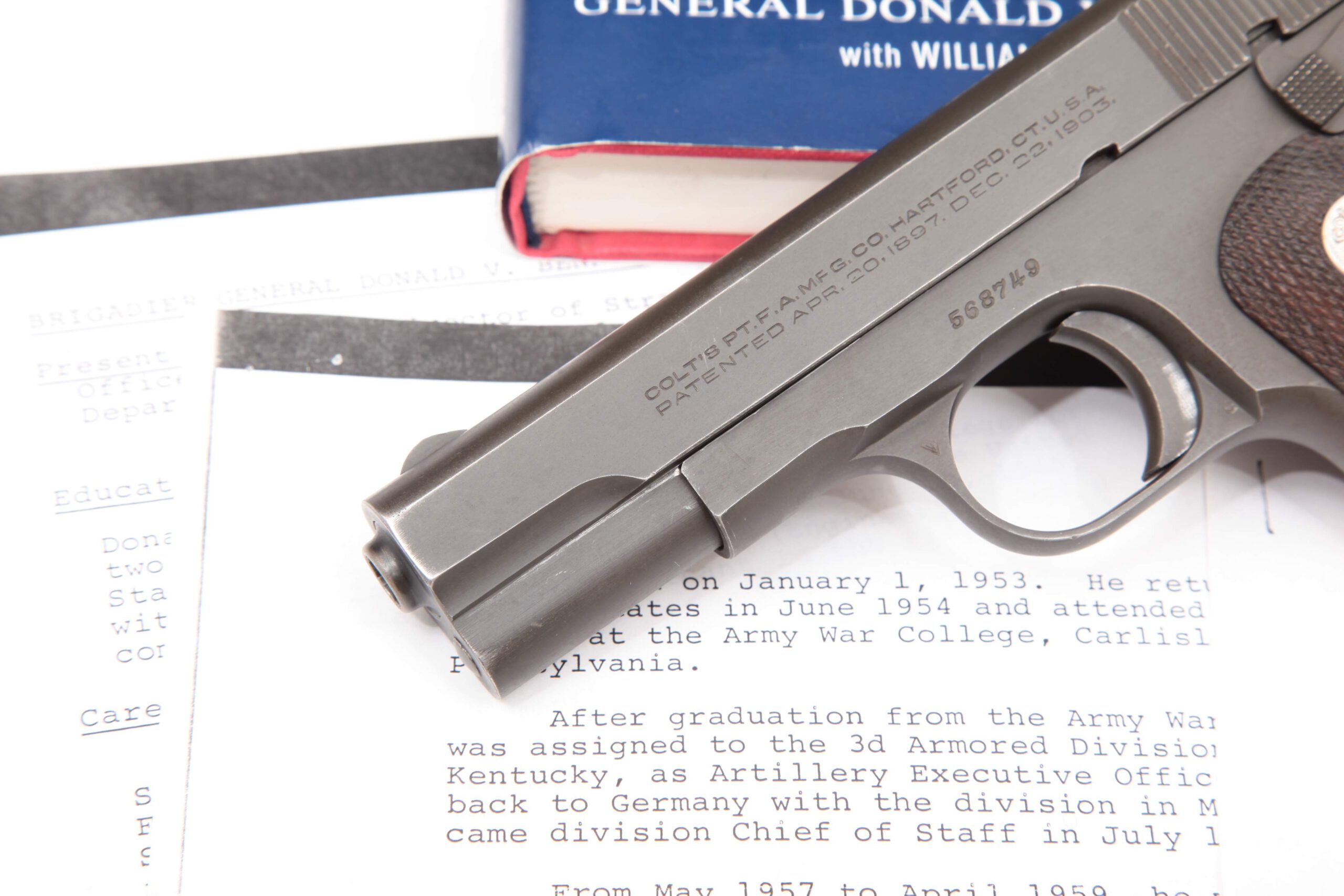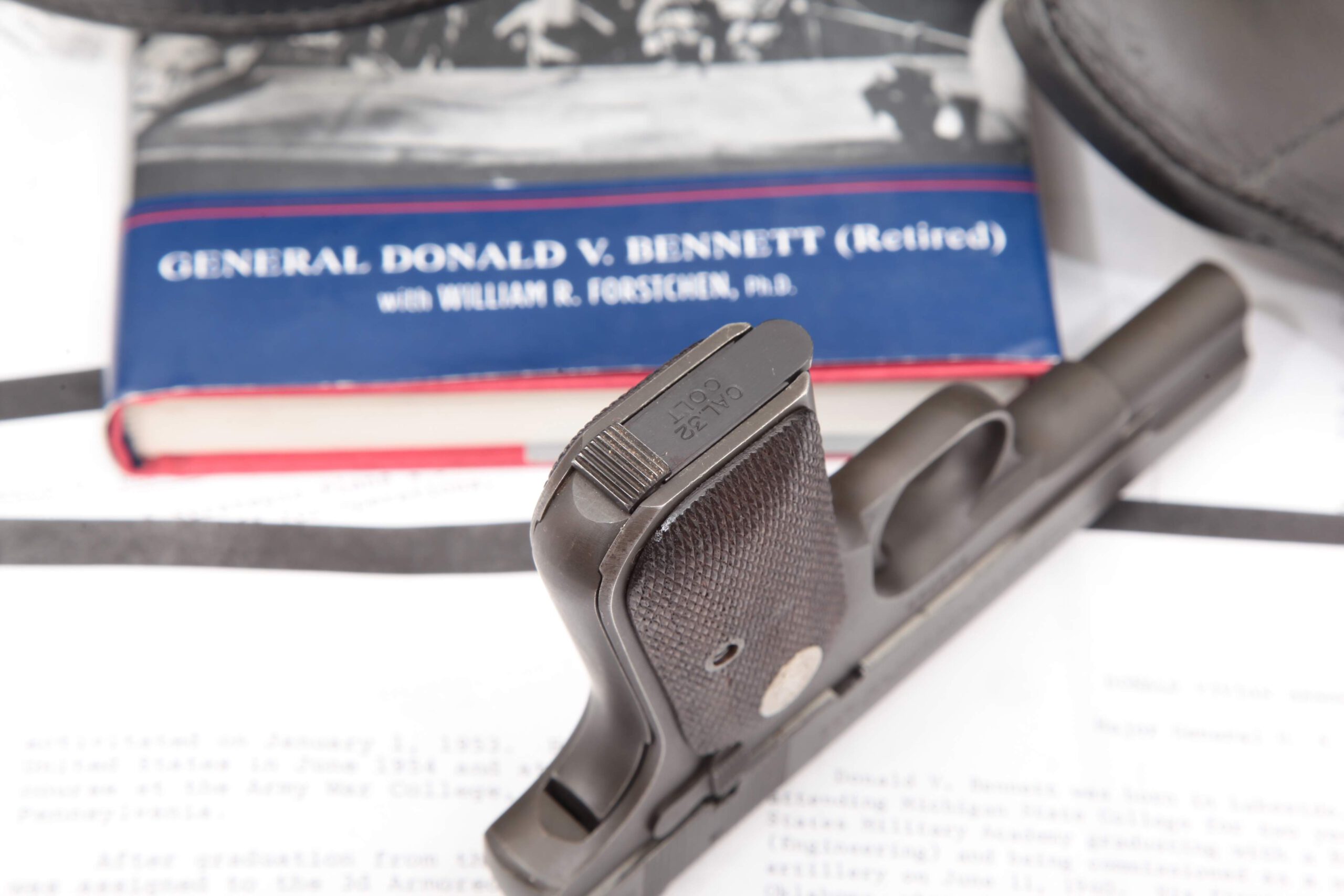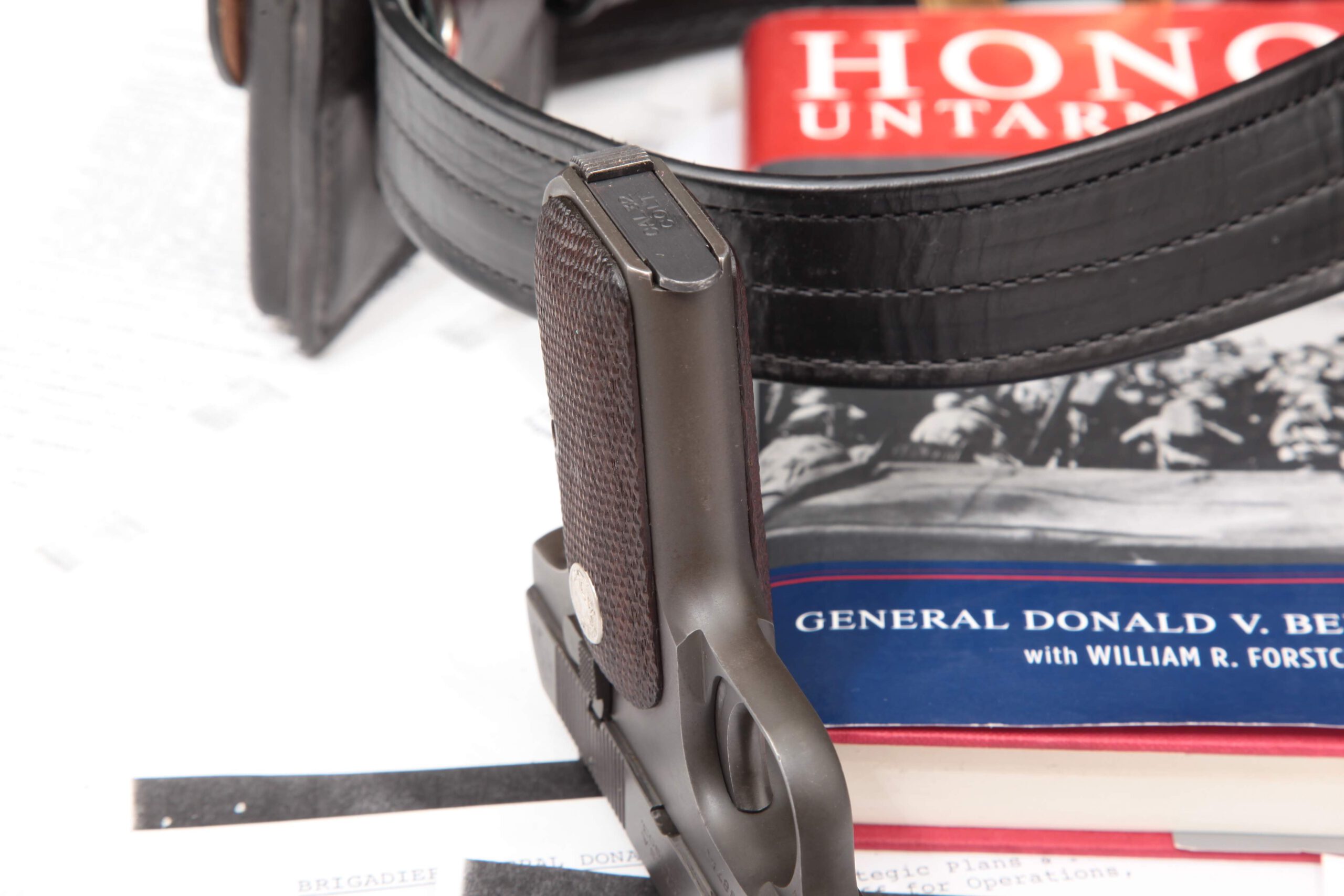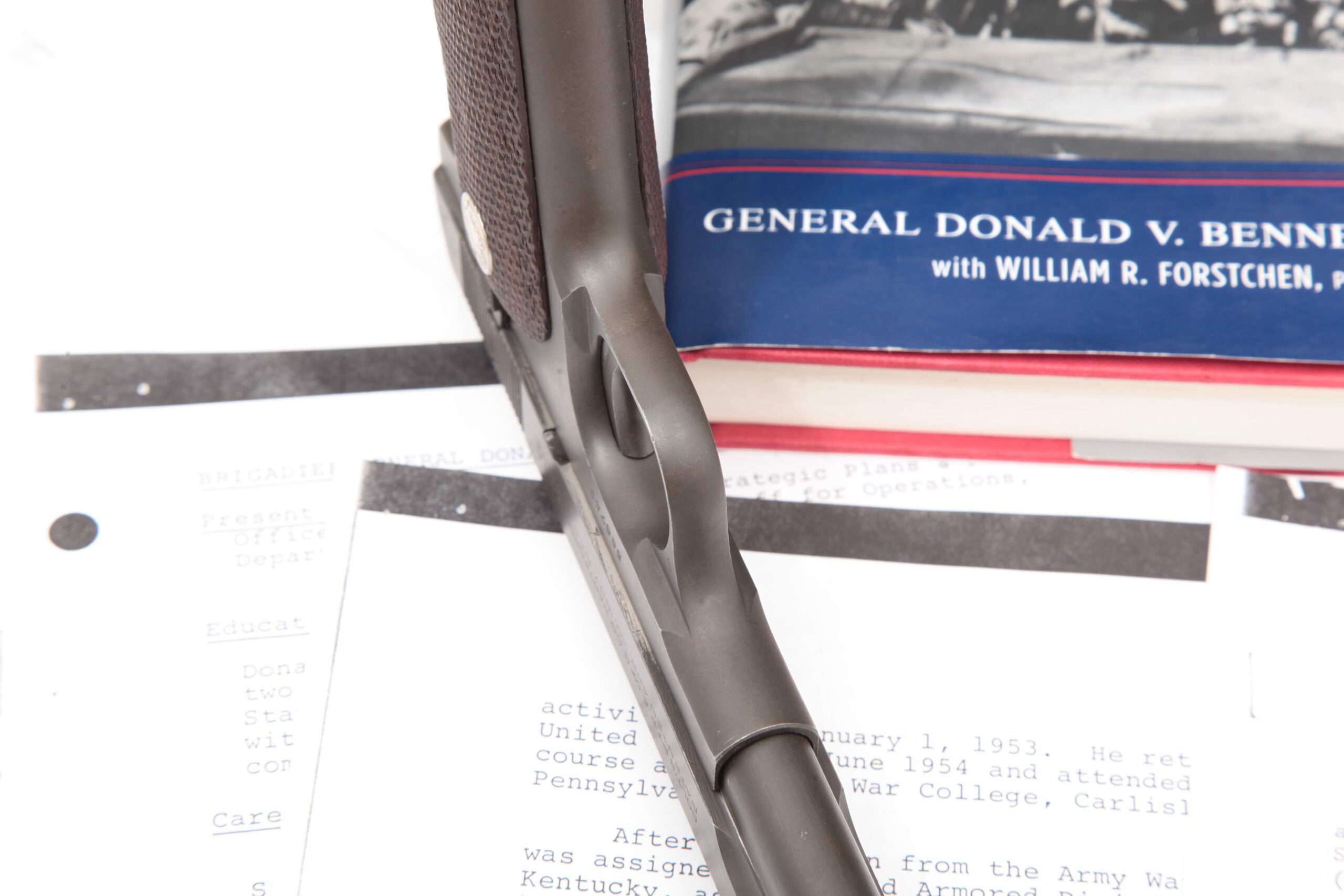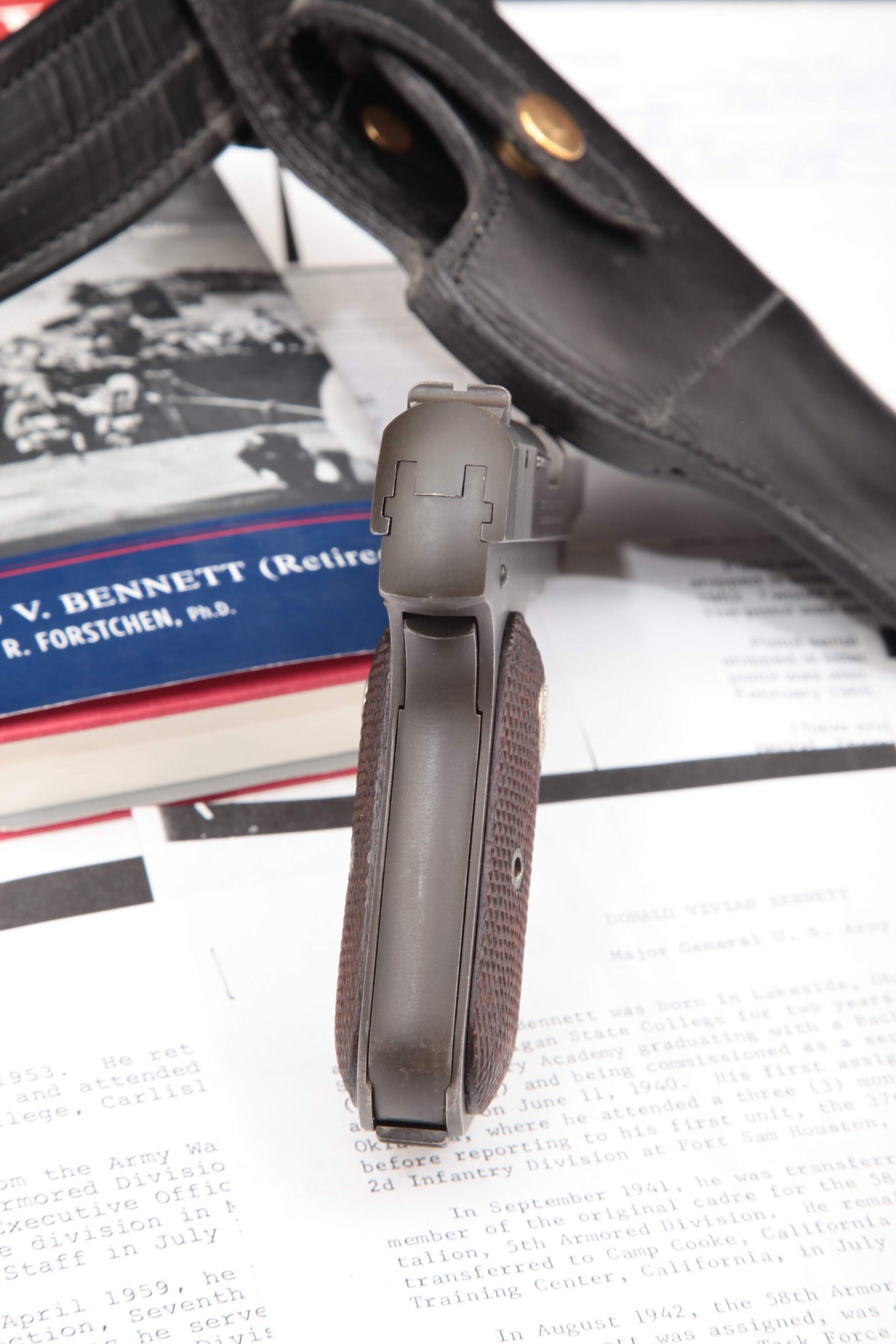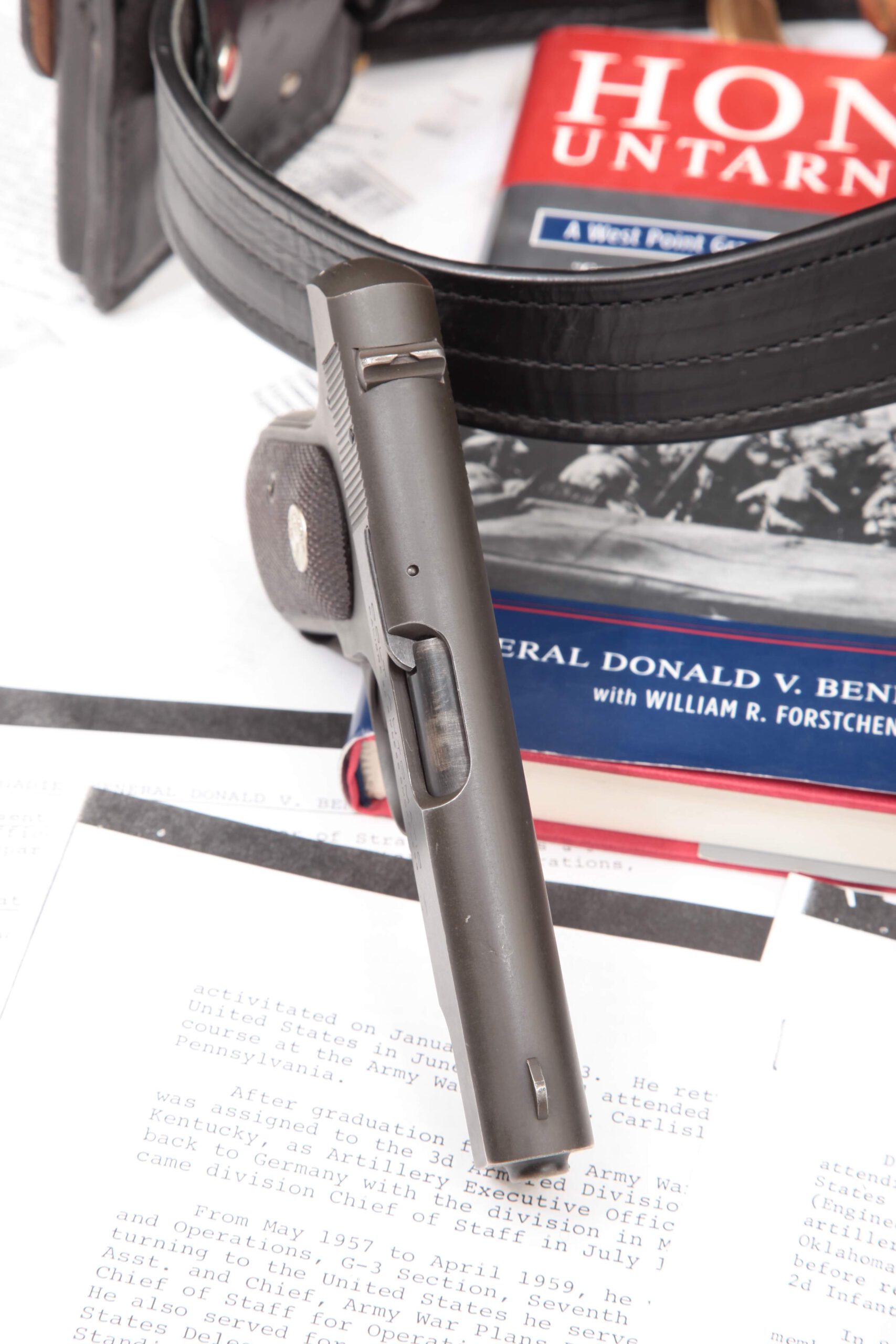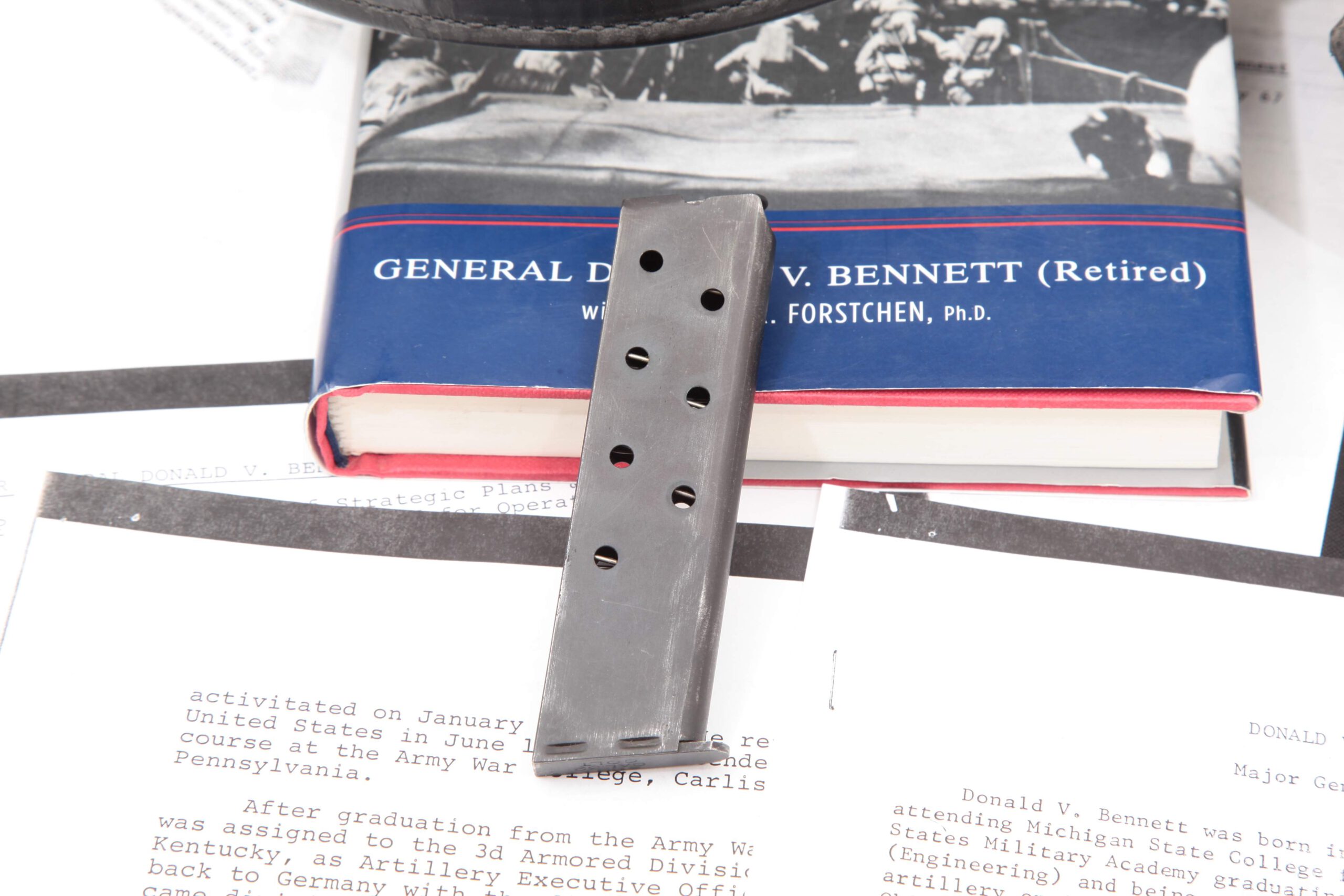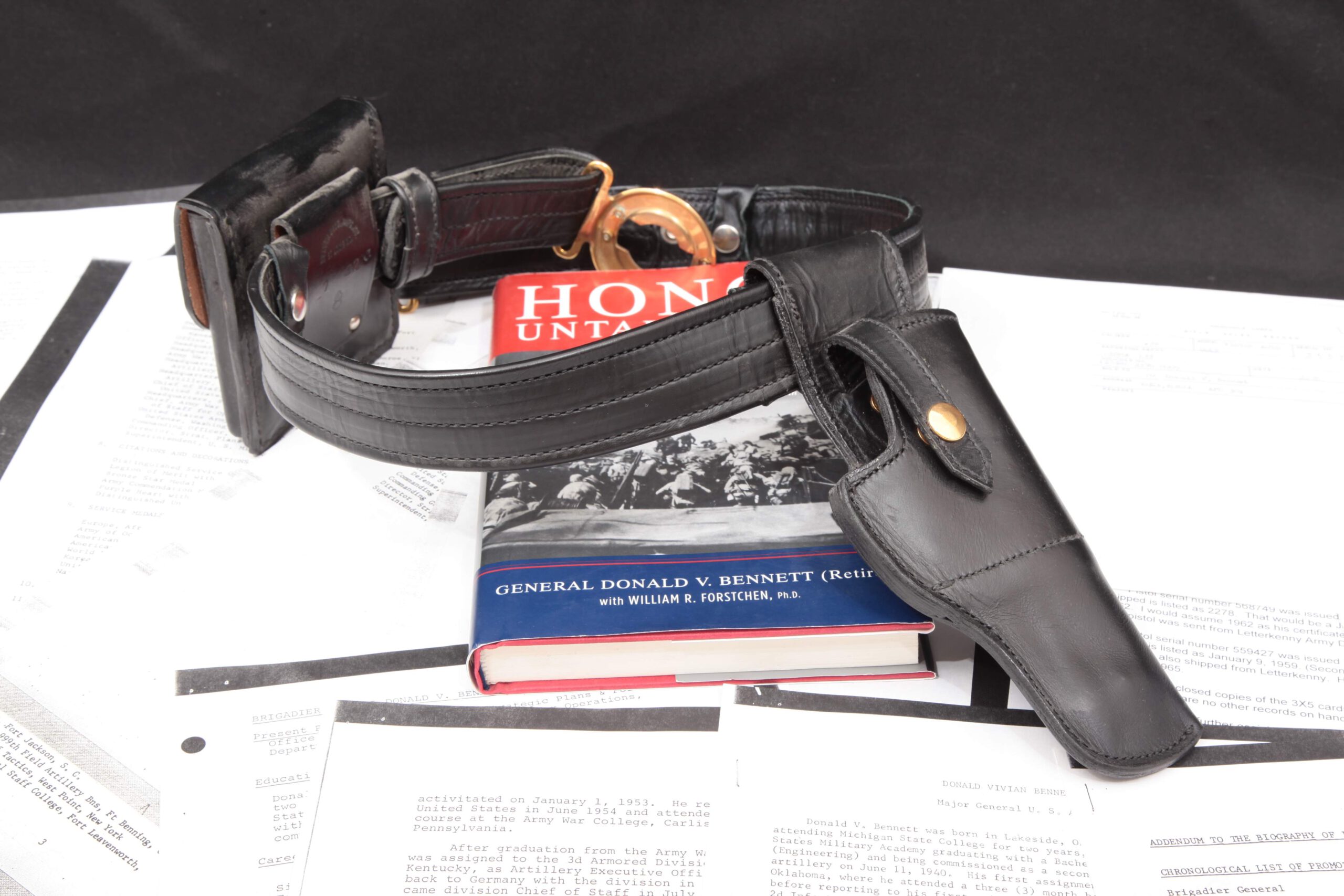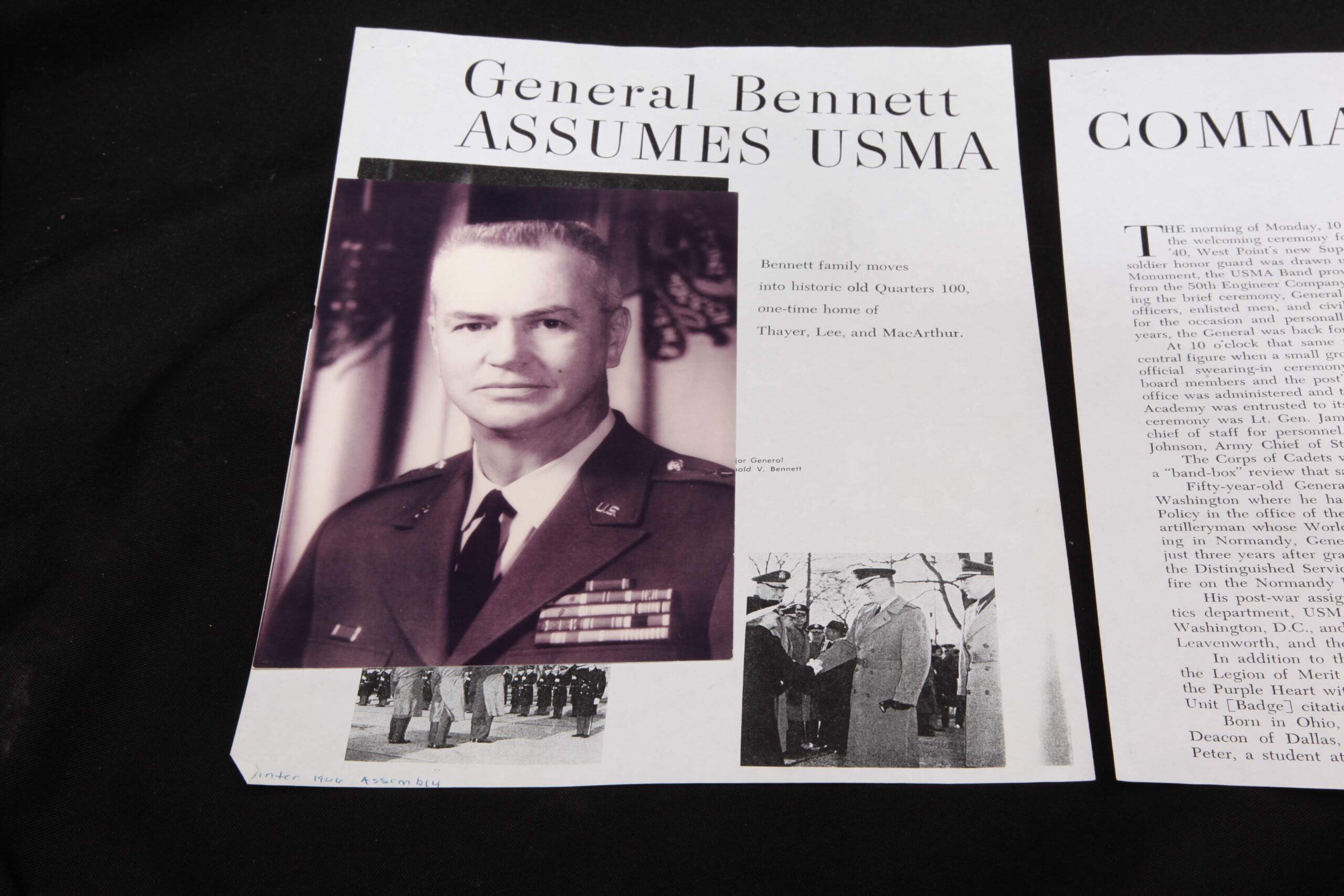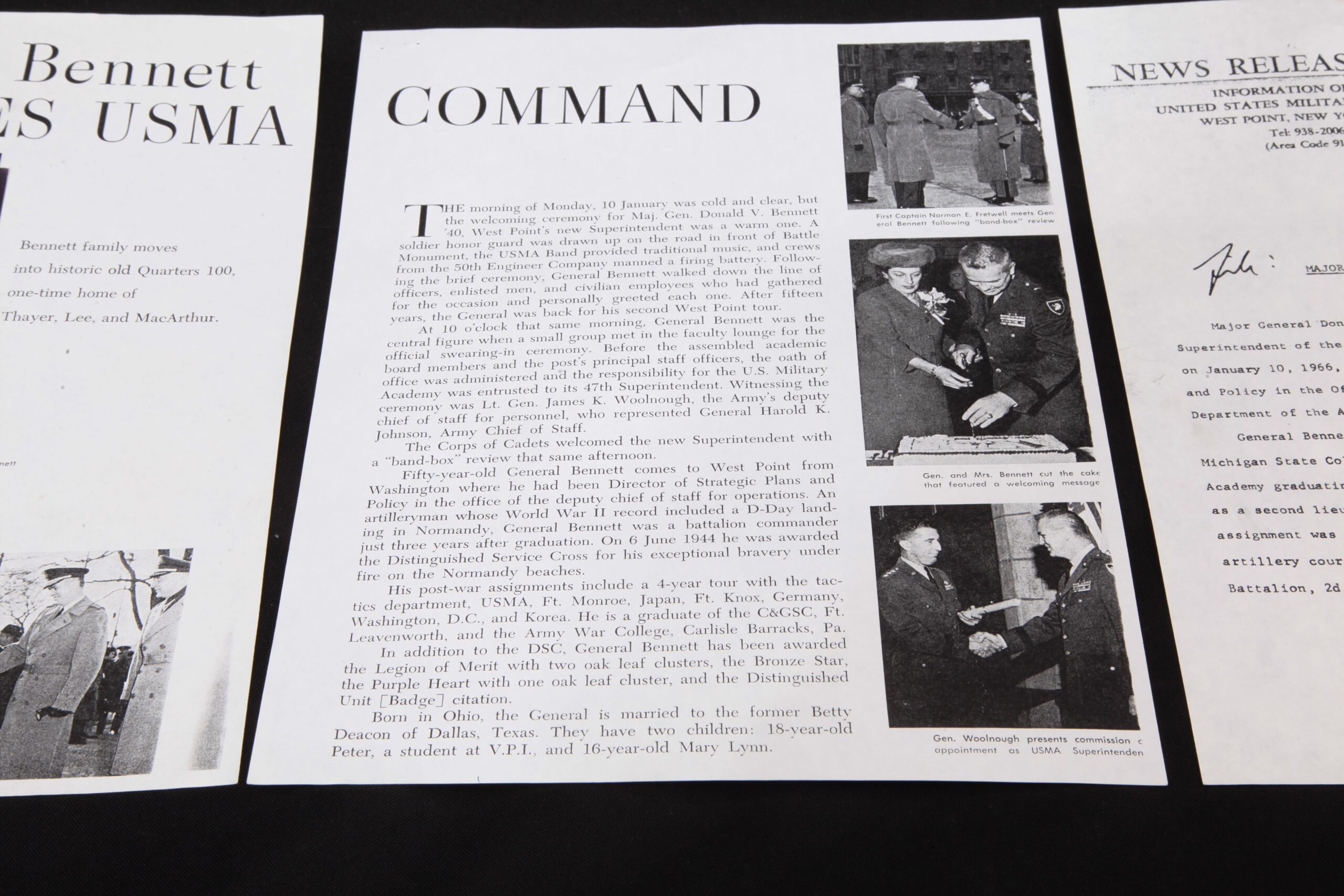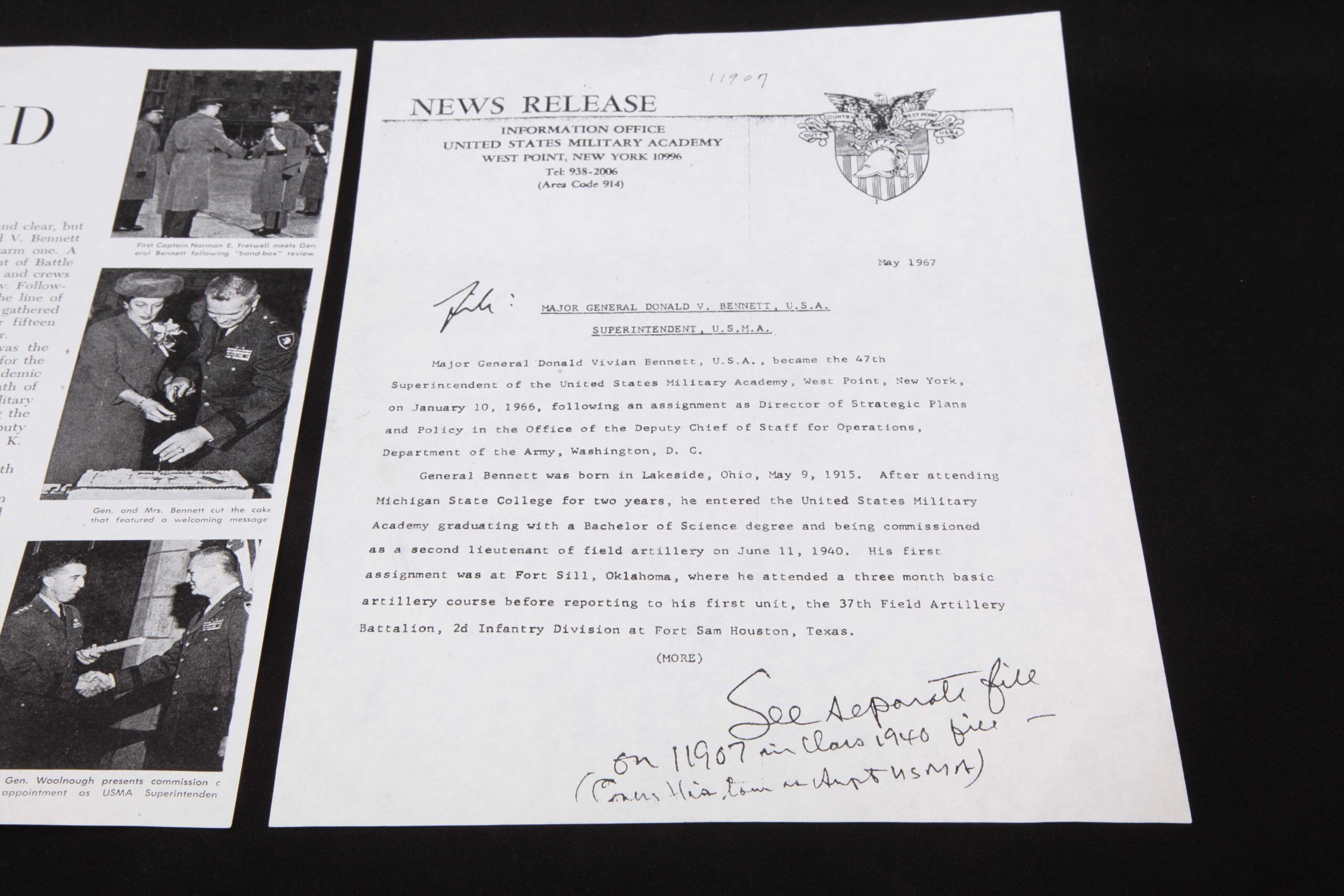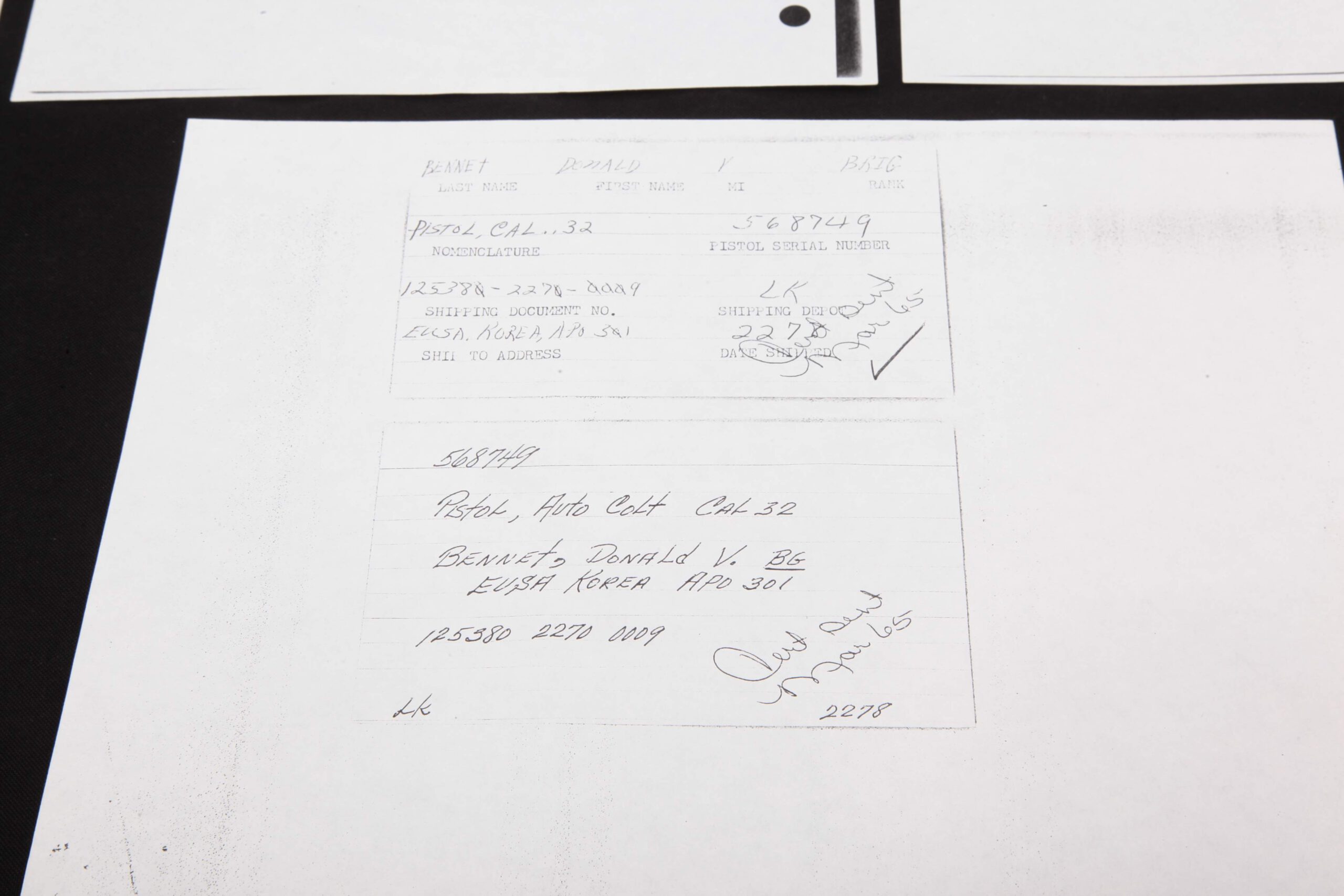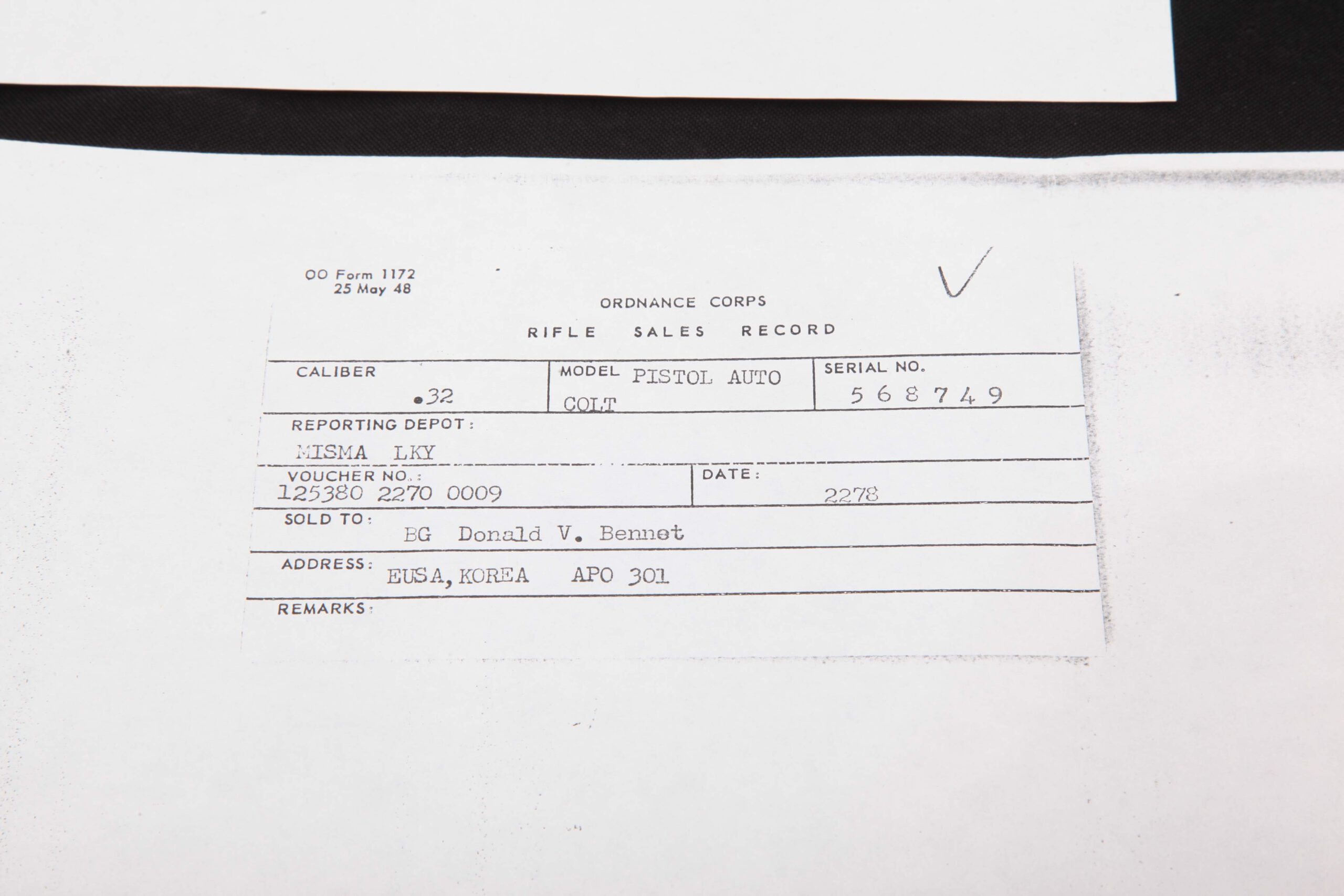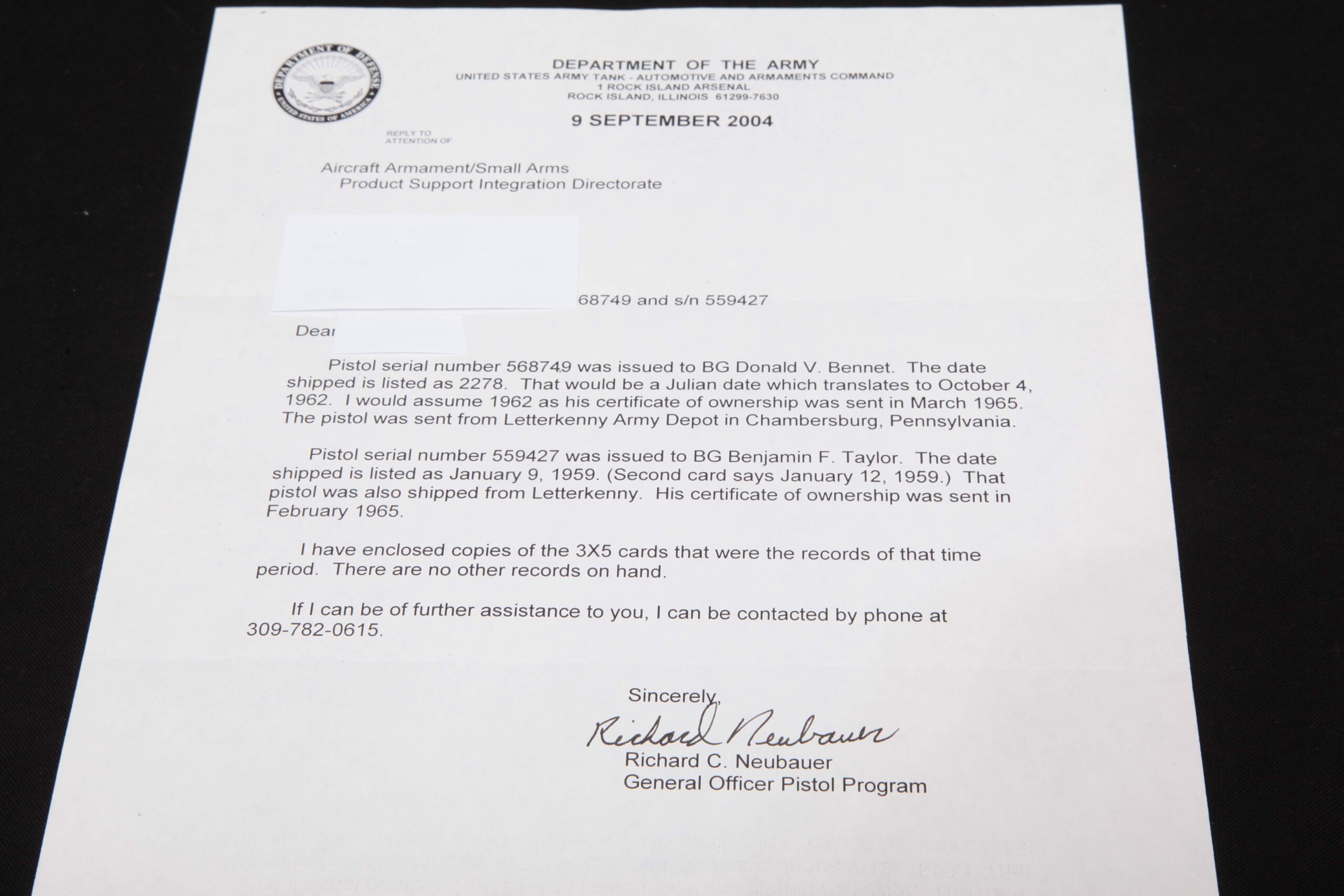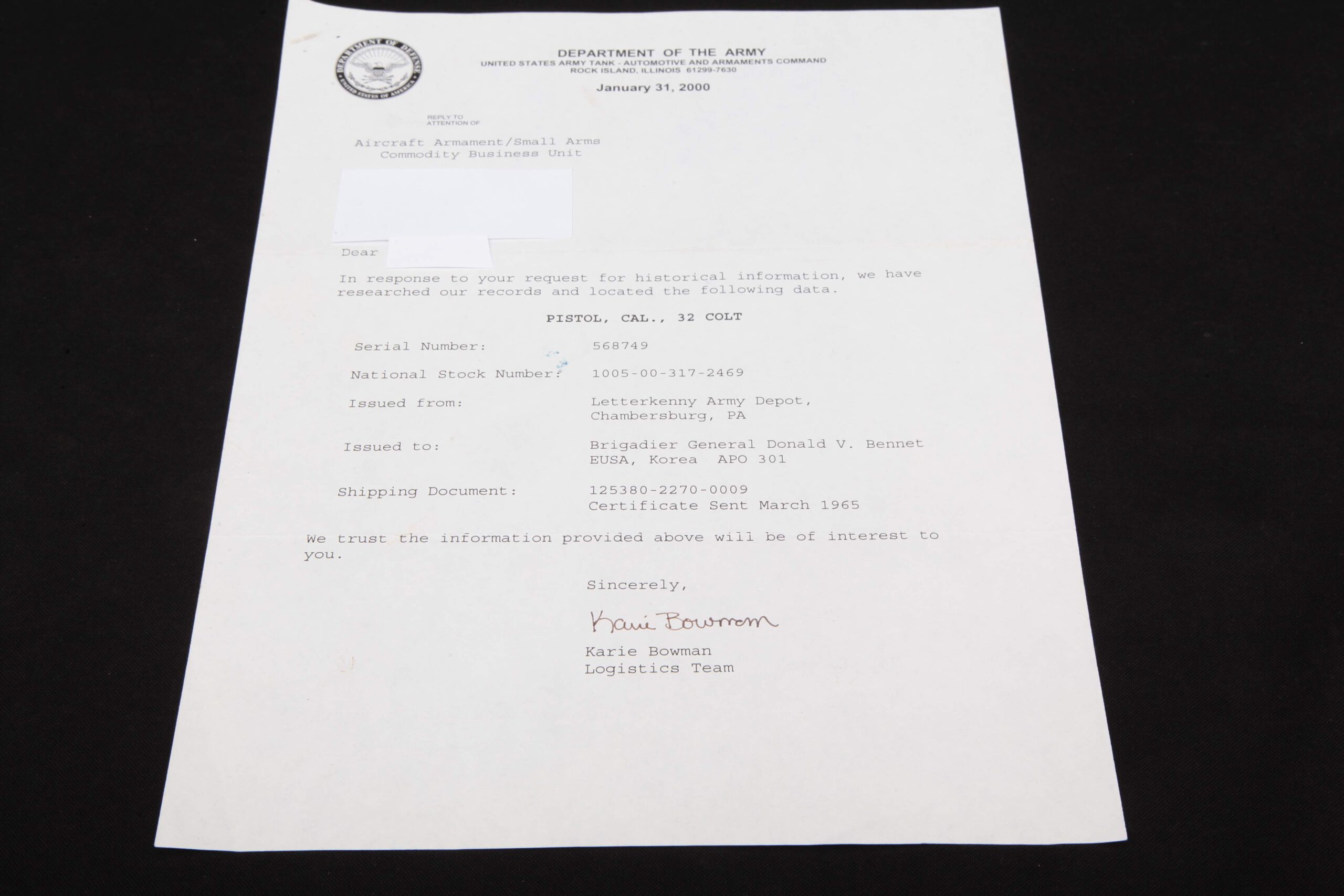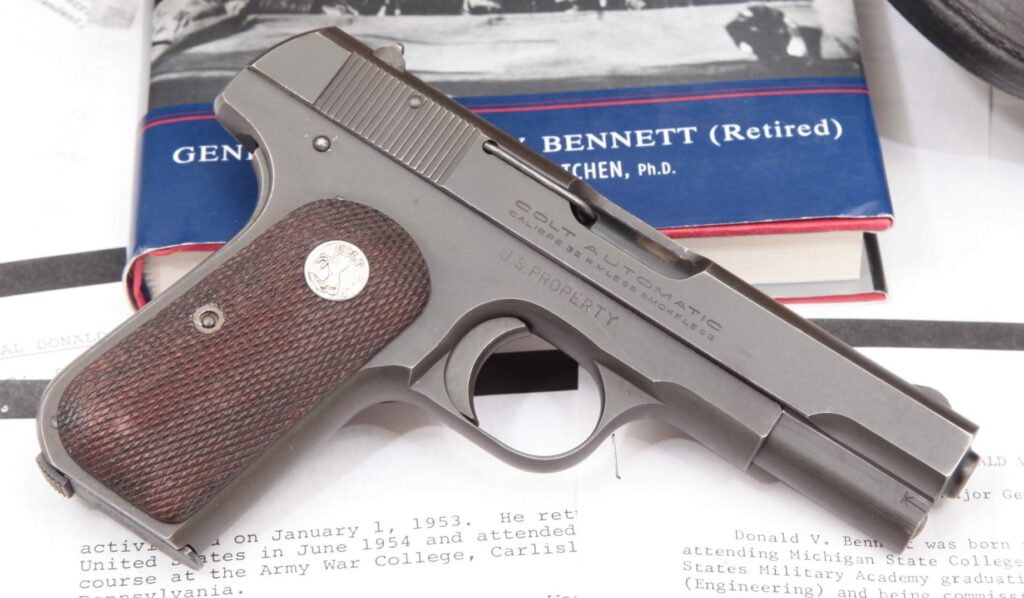
Colt Model 1903 General Officer’s Pistol Issued to WWII 4-Star General Donald Vivian Bennett
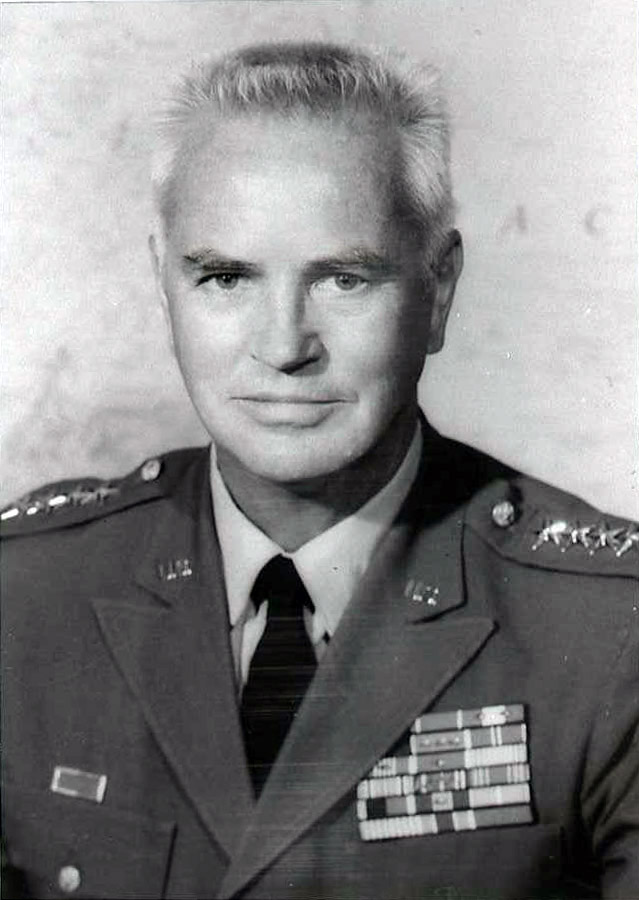
____________________________________________________________________________________________
NOT FOR SALE
____________________________________________________________________________________________
Donald Vivian Bennett was born in Lakeside, Ohio, United States to English immigrants Louis Bennett and Mary Grills Jacka. His family moved to Genoa, Ohio, and then to Oak Harbor, Ohio. He attended Michigan State University on a football scholarship, but the academics of Michigan State did not interest him. He applied for the United States Military Academy at West Point in 1934, but failed to secure an admission. In the summer of 1934, he worked for New York Central Railroad, working on the tracks. After his sophomore year at Michigan State University, he returned home to Ohio in Jul 1935. Learning from his father that West Point had just expanded the class size, he attempted it again. With the nomination from his local Congressman, he was admitted this time. Unfortunately, while he performed well in other subjects, he failed math, and was thrown out. With his father’s connections, he traveled to Washington, DC, United States to study under Mr. Sullivan, a former professor at West Point. After months of cramming, he returned in 1936 and graduated in 1940. He was married to Betty Deacon on 24 Jun 1940 shortly after graduation.
Originally thought destined for the Philippine Islands, Bennett found himself being sent to the Mojave Desert in southwest United States for a two-month long training in desert warfare. At Fort A. P. Hill in Virginia, United States, his unit was assigned the new M-7 Priest 105mm mobile artillery guns, a weapon so new that there were no printed manuals yet. Aboard converted ocean liner Santa Rosa, he was shipped to North Africa, landing on the invasion beaches only a handful of days after the initial landings. In Casablanca, he was placed in charge of a whore house maintained by the United States Army in order to keep troops content, then was assigned to be a part of the security team for Franklin Roosevelt and Winston Churchill during the Casablanca Conference. During this time, he worked closely with French Goum troops, who he came to respect; “they were truly frightful and proficient killers”, he recalled. During the Allied invasion of Algeria, he commanded M-7 guns in support of George Patton’s advance. On 9 May 1943, his unit reached Tunis, Tunisia.
On 7 Jul 1943, Bennett was sent to Bizerte, Tunisia to board a LST transport ship for the invasion of Sicily. He landed at Licata uneventfully. His battalion was ordered to race north to the northern coast, which it did, and en route the battalion took over 3,000 prisoners.
On 6 Jun 1944, Lieutenant Colonel Bennett and the 62nd Armored Field Artillery Battalion which he commanded landed on the Normandy coast with the second wave of invaders. He played a critical role in reorganizing four nearby infantry companies, four tanks, and an anti-aircraft unit, all of which were in disarray on or near the landing beach; with his makeshift force, he advanced and secured a ridge under heavy fire. As the Allies moved across France, he continued to lend front line infantry support from his artillery. While recalling his experiences during the break-out from Normandy, he noted in his memoir:
2 Mar 1945, Bennett crossed the Roer River, and shortly after he was sent to London, England, Britain for a short leave. At Westminster Abbey for a Sunday religious service, he observed “uniforms of those gathered there were from around the world, a dazzling display of the dying vestiges of the British Empire, combined with those of us from the New World and the grim survivors of occupied Europe.” He also noted that several stained-glass windows were broken, presumably damaged during the Battle of Britain or during German rocket attacks.
In May 1945, Bennett and his unit reached the Elbe River, and by 7 May he was in Czechoslovakia, several hundred miles behind George Patton’s Third Army spearhead. He continued to observe sporadic fighting, often from those of various Hitler Youth units. On the next day, his 30th birthday, he received word that fighting was to be over that night at midnight. “There was no glory, only relief, only a wish to lay down our tools of death and to rest”, he said. “I was never so old as I was on that night. All the years since then have been a gift.”
As a member of the Allied occupation force, Bennett witnessed a “betrayal of what we were supposedly fighting for”: Allied troops were told to turn all westward-traveling refugees back, leaving them in Russian occupied zone, with those soldiers whom these refugees were fleeing from. He witnessed first-hand the tensions between the Western Allies and the Russians that quickly built up after the end of the European War. He was notified that he would be sent to participate in the Pacific War, but Japan surrendered before he was shipped out.
After the war, Bennett returned to the United States in Nov 1945 via Boston, Massachusetts. Remaining in the US Army, he gained rank consistently in the post-war years. He served as the superintendent of the United States Military Academy from 1966 to 1969. Between 1969 and 1972, he was the Director of the Defense Intelligence Agency. In 1972, he was named the commanding general of the US Army Pacific Command. He retired from active service in 1974 and passed away in Asheville, North Carolina, United States in Nov 2005. He now rests at West Point, New York, United States in the academy’s cemetery.
https://ww2db.com/person_bio.php?person_id=412
____________________________________________________________________________________________
Wikipedia BIOGRAPHY:
Donald Vivian Bennett (May 9, 1915 – November 28, 2005) retired as a four-star general from the United States Army in 1974. He attended Michigan State University for two years, but then left to attend, and graduate from, the United States Military Academy in 1940. Bennett then served overseas in World War II in North Africa, Sicily, and in the invasion of the European continent. Bennett received the Distinguished Service Cross as well as two Purple Hearts for his service. He was born in Lakeside, Ohio and retired to Asheville, North Carolina. He entered military service from Ohio.
On 6 June 1944, Lieutenant Colonel Bennett, along with the 62nd Armored Field Artillery Battalion which he commanded, landed with the second wave at 0720 on D-Day. His party was subjected to a tremendous volume of machine gun fire which inflicted 50 percent casualties before they reached the comparative safety of the shingle at the base of the cliff adjoining the beach. Observing that following units were pinned down on the beach, he immediately left his cover and moved about the beach under heavy fire in order to assemble and reorganize the infantry assault companies, four tanks, and an antiaircraft unit.
By redistributing the remaining officers and equipment; by emplacing the .50 caliber machine guns of the antiaircraft unit so as to give close support to the infantry; and by radioing for tank and artillery fire support from the LCTs, he organized a sizable force and, at about 1000 hours, successfully assaulted the ridge. He then continued moving about the beach under intense fire and succeeded in locating a protected place to bring his battalion and move it across the beach. Lieutenant Colonel Bennett, in disregarding his own safety under such heavy enemy fire throughout the day and in his clear thinking, contributed immeasurably to the establishment of the beachhead.
General Bennett recounts his World War II experience in his memoir, Honor Untarnished, published by Tom Doherty Associates, LLC in 2003. General Bennett also served as superintendent of the United States Military Academy from 1966 to 1969. He was Commander of VII US Corps from June 1968 until September 1969, and Commander of U.S. Forces Korea from September 1972 until July 1973. He retired in 1974 as commanding general of the U.S. Army Pacific Command.
Bennett died on November 28, 2005 at the age of 90 and was buried at the United States Military Academy Cemetery in West Point, New York.
Gen. Bennett was inducted into the inaugural class of the Phi Kappa Tau Hall of Fame at the fraternity’s centennial convention in 2006.
____________________________________________________________________________________________
Distinguished Service Cross
AWARDED FOR ACTIONS
DURING World War II
Service: Army
RANK: Lieutenant Colonel
GENERAL ORDERS:
Headquarters, First U.S. Army, General Orders No. 45 (August 9, 1944)
CITATION:
The President of the United States of America, authorized by Act of Congress, July 9, 1918, takes pleasure in presenting the Distinguished Service Cross to Lieutenant Colonel (Field Artillery) Donald Vivian Bennett (ASN: 0-23001), United States Army, for extraordinary heroism in connection with military operations against an armed enemy while serving as Commanding Officer, 62d Field Artillery Battalion, in action against enemy forces on 6 June 1944, in France. When Lieutenant Colonel Bennett landed with the second wave at 0720 on D-Day, his party was subjected to a tremendous volume of machine gun fire which inflicted 50 per cent casualties before they reached the comparative safety of the shingle at the base of the cliff adjoining the beach. Observing that following units were pinned down on the beach, he immediately left his cover and moved about the beach under heavy fire in order to assemble and reorganize the infantry assault companies, four tanks and an anti-aircraft unit. By redistributing the remaining officers and equipment; by emplacing the .50 caliber machine guns of the anti-aircraft unit so as to give close support from the LCT’s, he organized a sizeable force and at about 1000 hours successfully assaulted the ridge. He then continued moving about the beach under intense fire and succeeded in locating a protected place to bring in his battalion and move it across the beach. Lieutenant Colonel Bennett, in disregarding his own safety under such heavy enemy fire throughout the day and in his clear thinking, contributed immeasurably to the establishment of the beachhead. His inspiring leadership, personal bravery and zealous devotion to duty exemplify the highest traditions of the military forces of the United States and reflect great credit upon himself and the United States Army.
____________________________________________________________________________________________
Army Distinguished Service Medal
AWARDED FOR ACTIONS
DURING Vietnam War
Service: Army
RANK: Major General
GENERAL ORDERS:
Department of the Army, General Orders No. 44 (August 22, 1968)
CITATION:
The President of the United States of America, authorized by Act of Congress July 9, 1918, takes pleasure in presenting the Army Distinguished Service Medal to Major General Donald Vivian Bennett (ASN: 0-23001), United States Army, for exceptionally meritorious and distinguished services to the Government of the United States, in a duty of great responsibility as Superintendent, U.S. Military Academy, West Point, during the period from January 1966 through June 1968.
____________________________________________________________________________________________
Army Distinguished Service Medal
AWARDED FOR ACTIONS
DURING Vietnam War
Service: Army
RANK: Major General
GENERAL ORDERS:
United States Military Academy Register of Graduates
CITATION:
(Citation Needed) – SYNOPSIS: Major General Donald Vivian Bennett (ASN: 0-23001), United States Army, was awarded a Bronze Oak Leaf Cluster in lieu of a Second Award of the Army Distinguished Service Medal for exceptionally meritorious and distinguished services to the Government of the United States, in a duty of great responsibility as Commanding General, SEVENTH Corps, from 1968 to 1969.
____________________________________________________________________________________________
Army Distinguished Service Medal
AWARDED FOR ACTIONS
DURING Vietnam War
Service: Army
RANK: Lieutenant General
GENERAL ORDERS:
United States Military Academy Register of Graduates
CITATION:
(Citation Needed) – SYNOPSIS: Lieutenant General Donald Vivian Bennett (ASN: 0-23001), United States Army, was awarded a Second Bronze Oak Leaf Cluster in lieu of a Third Award of the Army Distinguished Service Medal for exceptionally meritorious and distinguished services to the Government of the United States, in a duty of great responsibility as Director, Defense Intelligence Agency, from 1969 to 1972.
____________________________________________________________________________________________
Army Distinguished Service Medal
AWARDED FOR ACTIONS
DURING Vietnam War
Service: Army
RANK: General
GENERAL ORDERS:
United States Military Academy Register of Graduates
CITATION:
(Citation Needed) – SYNOPSIS: General Donald Vivian Bennett (ASN: 0-23001), United States Army, was awarded a Third Bronze Oak Leaf Cluster in lieu of a Fourth Award of the Army Distinguished Service Medal for exceptionally meritorious and distinguished services to the Government of the United States as Commanding in Chief, United Nations Command Korea from 1972 to 1973, and as Commander-in-Chief, U.S. Army Pacific from 1973 to 1974.
____________________________________________________________________________________________
Legion of Merit
AWARDED FOR ACTIONS
DURING World War II
Service: Army
RANK: Major
GENERAL ORDERS:
United States Military Academy Register of Graduates
CITATION:
(Citation Needed) – SYNOPSIS: Major (Field Artillery) Donald Vivian Bennett (ASN: 0-23001), United States Army, was awarded the Legion of Merit for exceptionally meritorious conduct in the performance of outstanding services to the Government of the United States as S-3 (Operations), 37th Field Artillery Battalion, from 1942 to 1943.
____________________________________________________________________________________________
Legion of Merit
AWARDED FOR ACTIONS
DURING Korean War
Service: Army
RANK: Colonel
GENERAL ORDERS:
United States Military Academy Register of Graduates
CITATION:
(Citation Needed) – SYNOPSIS: Colonel (Field Artillery) Donald Vivian Bennett (ASN: 0-23001), United States Army, was awarded a Bronze Oak Leaf Cluster in lieu of a Second Award of the Legion of Merit for exceptionally meritorious conduct in the performance of outstanding services to the Government of the United States with the G-3 (Operations and Training) Section, Headquarters, Army Forces in the Far East, from 1952 to 1954.
____________________________________________________________________________________________
Legion of Merit
AWARDED FOR ACTIONS
DURING Cold War
Service: Army
RANK: Brigadier General
GENERAL ORDERS:
Department of the Army, General Orders No. 22 (June 10, 1959)
CITATION:
The President of the United States of America, authorized by Act of Congress, 20 July 1942, takes pleasure in presenting a Second Bronze Oak Leaf Cluster in lieu of a Third Award of the Legion of Merit to Brigadier General Donald Vivian Bennett (ASN: 0-23001), United States Army, for exceptionally meritorious conduct in the performance of outstanding services to the Government of the United States with Headquarters, SEVENTH Army, from 22 May 1957 to 1 April 1959.
____________________________________________________________________________________________
Legion of Merit
AWARDED FOR ACTIONS
DURING Vietnam War
Service: Army
RANK: Major General
GENERAL ORDERS:
United States Military Academy Register of Graduates
CITATION:
(Citation Needed) – SYNOPSIS: Major General Donald Vivian Bennett (ASN: 0-23001), United States Army, was awarded a Third Bronze Oak Leaf Cluster in lieu of a Fourth Award of the Legion of Merit for exceptionally meritorious conduct in the performance of outstanding services to the Government of the United States from 1963 to 1966.
____________________________________________________________________________________________
